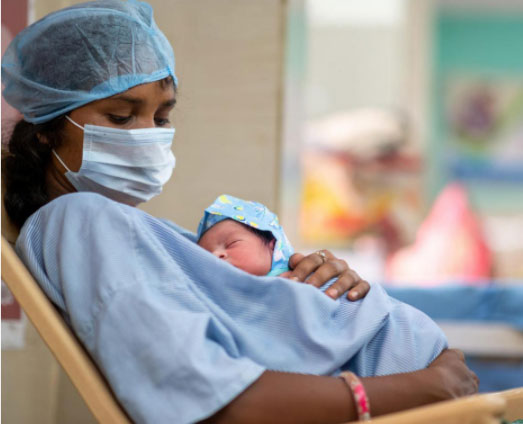
Study in finds more mothers died in Uganda
HEALTH | SARA JERVING | Pregnant women who were hospitalized with COVID-19 in sub-Saharan Africa died at higher rates and had more complications than non-pregnant women with similarly severe COVID-19, as well as pregnant women without the disease, according to a study in six African nations.
The study — the largest of its kind looking at this issue in sub-Saharan Africa — examined the outcomes of 1,315 hospitalised patients in 22 health facilities in the Democratic Republic of Congo, Ghana, Kenya, Nigeria, South Africa, and Uganda between March 2020 and March 2021. It analyzed records of pregnant women with and without COVID-19, as well as non-pregnant women with the disease.
Women with COVID-19 who were pregnant had a 2.4 times higher risk of needing intensive care and a two times higher risk of death compared with other women with the disease who weren’t with child. And among those who were pregnant, women with COVID-19 had a five times increased risk of death as compared to those without the disease.
The researchers did not see statistical differences among the outcomes in the six countries, lead author Jean Nachega, who is an associate professor of infectious diseases, microbiology, and epidemiology at the University of Pittsburgh’s School of Public Health, told Devex.
Pregnancy itself is an immuno-compromising condition, he said. This is why, for example, pregnant women especially need flu vaccines, because they are at a higher risk of complications.
“Pregnancy itself causes them to be vulnerable,” Nachega said.
The study also examined issues relevant to comorbidities in the sub-Saharan Africa context. The researchers found that pregnant and non-pregnant women with both COVID-19 and HIV or prior cases of tuberculosis had a nearly two fold increase of needing intensive care compared to those without.
This research generally echoes other research done globally, which was not specific to the sub-Saharan African context, but this study found a higher rate of death between infected and uninfected pregnant women than those other studies, Nachega said.
Prior research found COVID-19 significantly increased the risk of poor maternal and infant outcomes, such as pre-eclampsia, eclampsia, cesarean delivery, and maternal mortality compared to pregnant women without the disease. There were also higher rates of preterm births and stillbirths.
It’s important to conduct studies like this in different contexts rather than extrapolate research globally, Nachega said. In many contexts within sub-Saharan Africa, health systems are weak and access to care is limited, which can compound the impacts of becoming positive for COVID-19 while pregnant.
“Geographic disparities are important, because contexts are different and comorbidities are different,” he said.
This research should provide a boost to policymakers to increase vaccination rates among pregnant women, Nachega said.
“It really emphasises how important it is for pregnant women on the African continent to get vaccinated to prevent high morbidity and mortality,” he said.
Misinformation is a key contributing factor to vaccine hesitancy among pregnant women, he said, including rumours that the vaccines can cause infertility or harm to the fetus. One study, published late last year found that only 19% of pregnant women in South Africa were willing to receive a COVID-19 vaccination.
According to the World Health Organisation, “increasing evidence on the safety and effectiveness of COVID-19 vaccination during pregnancy suggests that the benefits of vaccination during pregnancy outweigh potential risks whenever there is ongoing or anticipated community transmission of the virus.”
Nachega said governments need to recommend the vaccine to pregnant women, which is currently happening in only about 11 African nations. And these recommendations need to reach health workers working throughout countries.
It’s also key to make vaccinations easy for pregnant women, including making them available at antenatal visits and at community-based pharmacies, he said. These would need to be coupled with campaigns making women feel at ease with taking the vaccines.
“I just came from South Africa, and I visited the obstetric gynecology department there. Just hearing about those moms who came in distress, died and lost their baby from COVID. It’s just heartbreaking when you think that could have been prevented,” he said.
******
SOURCE: Devex | Sara Jerving is a Senior Reporter at Devex, where she covers global health.
 The Independent Uganda: You get the Truth we Pay the Price
The Independent Uganda: You get the Truth we Pay the Price



